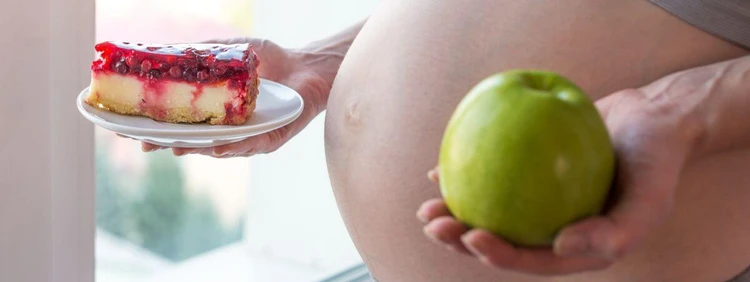Pregnancy cravings are weird.
One minute, you’re cruisin’ along, happy as can be.
The next?
You’re wrestling with an overwhelming urge to cram something into your mouth.
And what if that something is a great big slice of creamy, crumbly cheesecake?
Can you eat cheesecake while pregnant?
Is it safe?
Or is it one to avoid?
As is often the case with questions about food and pregnancy, whether it’s safe to eat cheesecake while pregnant isn’t a simple yes or no answer.
It depends on the type of cheesecake, the ingredients used, and how the tasty treat was prepared.
Read on to discover how you can enjoy a slice (or two) of this delicious dessert without putting yourself or your little one at risk.
Can you eat cream cheese when pregnant?
Is cheesecake safe to eat during pregnancy?
To answer that, you first need to scrutinize the ingredients.
Two things to look out for when choosing a cheesecake to satisfy your cravings are:
- Whether the cream cheese used for the cheesecake has been pasteurized, and,
- Whether the cake contains raw eggs or any other raw dairy products.
Remember: Pregnant women should avoid all unpasteurized cheese and raw dairy products due to the risk of nasty bacteria crossing over into the placenta.
So, the first step is to check whether the cream cheese (and all dairy products, such as milk and cream) have been pasteurized.
This is super important as pasteurization kills harmful bacteria such as Listeria monocytogene, which can cause Listeriosis.
This condition is very serious and, in some cases, can result in pregnancy loss.
Types of cream cheese to consider while pregnant
You might be wondering, what happens if you eat Philadelphia when pregnant?
Most store-bought spreadable cream cheese, such as Philadelphia, is pasteurized — but it’s always worth double-checking the label to ensure this is the case.
Always opt for pasteurized cream cheese. Unpasteurized dairy products could also contain E.coli, which can cause diarrhea or more severe illnesses. It’s just not worth the risk.
Cheesecake and pregnancy: avoid raw eggs!
The second thing to look out for is whether the cheesecake has been made using raw eggs.
Raw eggs can contain salmonella, which can be passed on to your baby, resulting in serious medical conditions such as meningitis or sepsis.
Cheesecakes made using raw eggs (or raw dairy products) are typically homemade and set in the fridge.
If you’re in a restaurant or a friend offers you some homemade cheesecake, always double-check the ingredients and ask how the cheesecake was prepared.
If they’re unable to tell you, it’s best to politely decline the offer.

Types of cheesecake you can enjoy while pregnant
Okay, so it’s beginning to sound like you won’t be able to enjoy the creamy, sweet taste of cheesecake until after your pregnancy.
But don’t worry, cheesecake and pregnancy can still be friends!
Here are some types of cheesecake that are considered safe to eat during pregnancy:
- Baked cheesecake: If the cheesecake has been made using pasteurized cream cheese with thoroughly cooked eggs (at a temperature of at least 160C/320F), then it’s considered safe to eat. A typical example of a baked cheesecake is a “New York” style cheesecake, which you can find in most stores.
- Vegan cheesecake: An alternative to traditional dairy-filled cheesecake is to opt for a vegan-friendly version made with ingredients such as coconut milk or vegan cream cheese.
- No eggs: If you’re making a no-bake cheesecake (with pasteurized cream cheese, of course), gelatin can be used as an alternative to eggs to emulsify the mixture. However, if you’re going to use eggs within your no-bake cheesecake, most stores stock pasteurized eggs that are deemed by the FDA as safe to eat raw.
To recap: cheesecake and pregnancy
So, is cheesecake safe during pregnancy? It depends!
Some types of cheesecakes can be enjoyed when pregnant, while others are best left alone.
If you choose this delicious treat, always check that the ingredients contain pasteurized cream cheese and thoroughly cooked or pasteurized eggs.
Avoid any cheesecake made with unpasteurized cream cheese or raw eggs, as this may cause foodborne illness.
More on pregnancy foods:
Can Pregnant Women Eat Honey?
Can Pregnant Women Eat Cream Cheese?
Can Pregnant Women Eat Grapes?
Can Pregnant Women Eat Pineapple?
Can Pregnant Women Eat Mushrooms?
Can Pregnant Women Eat Popcorn?
Can Pregnant Women Eat Feta Cheese?
Can You Drink Green Tea While Pregnant?
Can You Drink Chamomile Tea While Pregnant?
Can You Eat Mozzarella When Pregnant?
Can You Eat Cherries While Pregnant?
Is Eating Dates During Pregnancy Okay?

